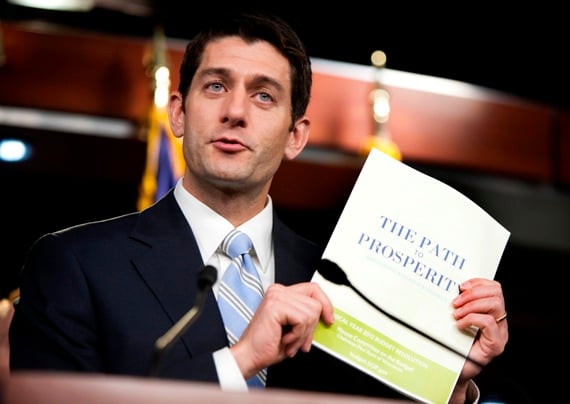Rep. Ryan's plan envisions big cuts to Medicare, Social Security, but also caps tax rate at 25%
U.S. House Republicans today unveiled a plan to overhaul the federal budget and slash the deficit in coming years by about three-quarters, with a $6- trillion cut in spending and 25 percent cap on tax rates.
The proposal, the Republicans' first comprehensive budget plan since the November elections, would cut the deficit next year to $995 billion from $1.4 trillion now. It would continue to narrow the shortfall to as little as $379 billion in 2018, though it wouldn't balance the government's books until 2040.
House Budget Committee Chairman Paul Ryan's plan relies on spending cuts to reduce the red ink, slicing more than $6 trillion over the next decade out of Medicare, Medicaid, food stamps and scores of other programs. At the same time, his proposal calls for cutting taxes, with the top corporate and individual tax rates set at 25 percent.
“We believe that we have the moral responsibility to step in and provide the leadership that the president has not been providing,” Ryan told reporters today in Washington. “He punted on debt reduction. We're not going to do that.”
The plan marks a major escalation in Washington's budget wars where lawmakers have been debating for months funding levels for the remainder of the government's current fiscal year. Ryan's proposal presents substantial political risk for Republicans because Democrats are sure to pounce on proposed cuts to popular government programs before next year's presidential and congressional elections.
Cut Deficit, But Not Entitlements
While public opinion polls show Americans want Congress to bring down the federal deficit, they want that done without harming entitlements such as Medicare and Social Security or many discretionary spending programs. Yet it's the soaring cost of entitlements that represent the biggest threat to the government's long-term financial standing, according to the nonpartisan Congressional Budget Office.
Ryan's plan “is the same old ideological agenda, except this time on steroids,” said Representative Chris Van Hollen, of Maryland, the ranking Democrat on the budget committee, in an interview on Bloomberg Television.
The lawmakers' annual budget lays out their agenda for the year, though it wouldn't itself make any changes in tax and spending laws. That would require subsequent legislation.
Phasing Out Medicare
Ryan's plan calls for phasing out the traditional Medicare program and replacing it with a plan to provide individuals subsidies to buy private health insurance with payments offered on a sliding scale, with the poor and sick getting more and the wealthy getting less. It would only apply to those under the age of 55 to spare from cuts current beneficiaries as well as those approaching retirement.
The plan would reduce the Medicaid health care program for the poor by more than $700 billion over the next 10 years by capping the open-ended program and allowing states more discretion over how to run it. It doesn't propose specific cuts to Social Security. Other mandatory programs, including food stamps, would be cut by $1.8 trillion under the plan.
The domestic discretionary programs lawmakers are currently debating in Congress would face even bigger cuts under Ryan's plan; he proposes to reduce spending there to below 2008 levels and to freeze it for five years.
The plan doesn't seek defense cuts beyond what the administration has proposed.
“I don't intend to be a lot to the left of a Democratic president on defense,” Representative Tom Cole, an Oklahoma Republican, said before the budget's release.
Dispute Within Party
Ryan's proposal comes amid an internal dispute among Republicans over how far the party should go in cutting the deficit. Some lawmakers, pointing to the party's “Pledge to America” promise to put the government on a path to a balanced budget, said that means Ryan's budget should erase the deficit within 10 years.
That's a tall order. The administration's debt commission last year offered a plan that wouldn't show a balanced budget for more than 25 years, while a shadow group of independent budget experts gave up trying to show a plausible path toward balancing the budget.
President Barack Obama's budget got the deficit down to $750 billion in 2015, though it would begin growing again in subsequent years.
Representative Joe Walsh, a freshman Republican from Illinois, said he would have a “real hard time” voting for Ryan's budget if it didn't erase the deficit.
“It would be hard to go back home and take to my people back home a plan that will balance the budget in 20 or 25 years -- I couldn't do that with a straight face,” he said.
--Bloomberg News--







